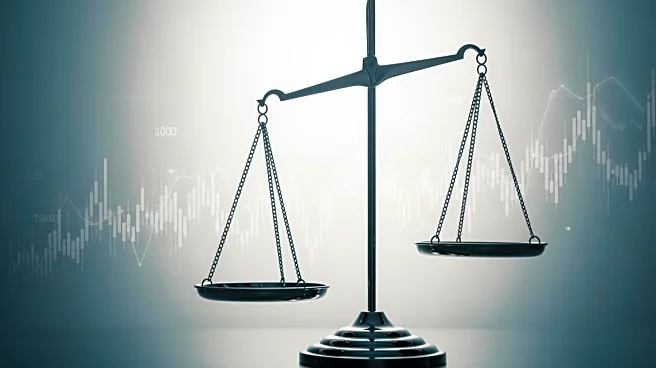What's Happening?
Federal Reserve Chairman Jerome Powell has indicated that a slowdown in hiring is posing a growing risk to the U.S. economy, suggesting that the Fed may cut its key interest rate twice more this year.
Despite a federal government shutdown affecting official economic data, Powell stated that the outlook for employment and inflation remains largely unchanged since the Fed's September meeting, where the rate was reduced for the first time this year. Powell emphasized that tariffs have increased the Fed's preferred measure of inflation to 2.9%, but broader inflationary pressures are not expected to persist. Economists anticipate further rate cuts, with the next meeting scheduled for October 28-29.
Why It's Important?
The potential rate cuts by the Federal Reserve could have significant implications for the U.S. economy, particularly in reducing borrowing costs for mortgages, car loans, and business loans. This move is aimed at stimulating economic growth and addressing employment concerns. The Fed's actions are closely watched by economists and financial markets, as they influence interest rates and economic stability. The decision to cut rates further reflects the Fed's focus on supporting the job market amid rising downside risks to employment.
What's Next?
The Federal Reserve is expected to make further decisions regarding interest rate cuts at its upcoming meeting in late October. Economists and market analysts will be closely monitoring the Fed's actions and statements for indications of future monetary policy. Additionally, the Fed may soon stop shrinking its balance sheet, which could further impact borrowing costs over time. The Fed's approach to managing interest rates and its balance sheet will be critical in shaping the economic outlook.
Beyond the Headlines
The Fed's practice of buying longer-term Treasury bonds and mortgage-backed securities during the COVID-19 pandemic has faced criticism for potentially worsening inequality by boosting the stock market. Powell defended these actions as necessary to support the economy during challenging times. The Fed's ability to pay interest on reserves is also under scrutiny, with bipartisan efforts to limit this practice recently defeated in the Senate.








